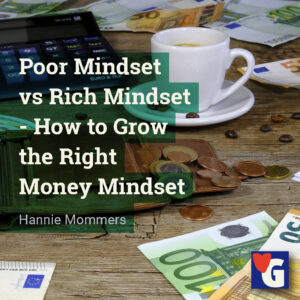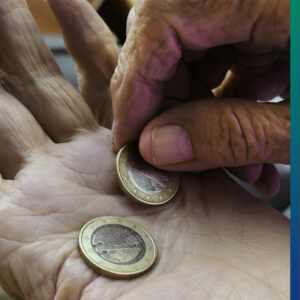
As you are aging you will have thoughts about your finances. Hopefully these are only positive thoughts, because there is a relationship between a negative attitude and being poor. Yet, positive or negative, it’s good to have a grip on your finances.
This article has 2 perspectives. On the one hand to be actually poor or rich, in terms of money. And on the other hand to be rich or poor in your view of wealth. In other words poor mindset vs rich mindset.
We all have a different view on what wealth is. For some people it means having a lot of money, for others being content and happy is more important.
Table of contents
Inequality
An Oxfam report of 2018 says the world’s 26 richest people own as much as the poorest 50% of the global population. The main reasons they report are:
- Lining the pockets of the world’s billionaires;
- Wealth is under taxed;
- Underfunded public services, 258 million children are not allowed to go to school;
- People are denied a longer life, due to unaffordable healthcare;
- Inequality is sexist.
A global wealth tax has been called for by the French economist Thomas Piketty. Backed by my fellow countryman Rutger Bregman who shocked the World Economic Forum in Davos by saying: ‘Stop talking about philanthropy, start talking about taxes‘.
It is said that if the richest people would pay 1% of their wealth all the children who are now denied education could go to school.
What beliefs will your children inherit?

My parents came from poor families. They grew up in the time of the Depression and were adolescents during World War II. After the war, all their efforts were focused on rebuilding the country and making money.
Their aim was to let us have a good education, so we could live a better life than they had. As you can imagine I am forever grateful to them for this opportunity they gave me. But parents ingrain their beliefs in children, consciously or unconsciously.
And some beliefs of my father hindered me part of my life:
- Don’t get ideas above your station;
- Rich people are dishonest;
- Don’t take risks, saving is safer than investing.
It wasn’t until I attended a financial business seminar that I discovered how my father’s beliefs unconsciously influenced my actions. Even though I was convinced my views were completely different.
Are poor people themselves culpable of being poor?
Some poor people manage to create a better life for themselves. Because of this, others believe that it is the poor people’s own fault if they don’t achieve that as well. But not everyone sees or gets opportunities.
Many rich people would rather donate money to charity than pay taxes. In several countries this is tax-deductible, which makes it extra attractive.
Personally, I don’t understand this game of dodging or avoiding as much tax as possible. Do these people not want the streetlights to be on, that the police come when their house is burgled or that children can go to school?
Poor Mindset vs Rich Mindset

Stanford psychologist, Carol Dweck, relates in her insightful book, Mindset: The New Psychology of Success, there are two types of mindsets: a fixed mindset and a growth mindset. These mindsets are what we consider our personality.
A fixed or poor mindset is one where it’s assumed our character, creative ability and intelligence are fixed traits that cannot be changed. These people believe their basic abilities are what you are born with and they will only ever have a certain amount.
People with a poor mindset always want to appear intelligent since they don’t believe intelligence can be modified. They fear appearing dumb to others believing they will always look that way once others see them as being unintelligent.
Some common poor mindset thoughts include:
- Either I’m good at something, or I’m not;
- I can’t learn now; it’s too late;
- There’s no point in trying if I’m going to fail;
- That’s just the way I am;
- I always struggle with… ;
- I’m a procrastinator;
- I’m not creative;
- It’s hard for me to lose weight.
Flexible people

Growth or rich mindset, on the other hand, is the belief that abilities and intelligence can grow with time and experience. People with a rich mindset believe they can become smarter, that their efforts affect their success and with persistence they can learn.
Those with a growth mindset believe their basic ability is only the starting point for their true potential. The rich mindset creates a passion for learning rather than a constant need for approval.
Some common rich mindset thoughts include:
- Practice will always make me better at something;
- I can learn whatever I want or need to, exactly when I need to learn it;
- Failures are opportunities to learn, to reassess, and to do better next time;
- I can always do better at something if I want to, but it will take effort;
- Determination and effort are the measures of my outcomes;
- I enjoy learning and growing, and learning is a lifetime pursuit for me.
How to better yourself financially
Know your numbers
Feeling responsibility for your money means you know exactly what your numbers are. A lot of your numbers you can read from your bank accounts. Nowadays you can even look at them on your phone.
It’s a good thought to combine your bank-, savings- and investing accounts in one document. You can use a simple spreadsheet or a special bookkeeping program. Keep it simple. That way chances are high you will keep doing it.
Divide your income and expenses into a few categories and make an overview at the end of the year. Or at the end of each quarter. That way you have numbers to compare.
Earmark your money

Even when you are a pensioner earmark your money as soon as it arrives in your bank account. For instance:
- Usual expenses 70%
- Saving (short term) 5%
- Investing (long term) 5%
- Emergency fund 10%
- Pocket money 10%
The percentages can be whatever suits you best. When your income is low try to save at least 1% or 2%. The habit counts for more than the actual amount.
And if you want to add something to this list, for instance saving for a trip or putting money aside to replace the car in a few years, by all means do. It is YOUR list.
Avoid debt
The number one tip is to avoid debt. Don’t buy on credit and either throw away your credit card or use it as little as possible. You don’t need a credit card if you have a debit card.
This is solid advice for both men and women. Often one of a couple takes care of the money. And if something unexpected happens, the other one is at a loss.
- When you are married, make sure both of you know the ins and outs of your money;
- If you don’t keep your books yourself, but have a bookkeeper, ascertain you understand what he or she is doing;
- Don’t leave the handling of your investment account to a broker without knowing about the decisions.
Related: Do Women love Money? Or do we have a Love-Hate Relationship with Money?
Are you in for a change?

There are key differences between a poor mindset and a rich mindset. Challenge is one of them. A person with a poor mindset will shy away from a challenge, often from fear of failure. They may go into hiding to avoid responsibilities.
The rich mindset person is excited by challenges. They find them engaging and a key in learning something valuable from the experiences. They master the challenge and move to greater accomplishments.
Another key difference is in how each faces mistakes and feedback. A person with a fixed mindset is embarrassed by making mistakes. They blame others or become defensive when criticized. The growth mindset person sees mistakes as a learning lesson. They are less likely to take criticism personally. They are open to criticism believing it helps improve their ability to do better next time.
If you find you have a poor mindset and you genuinely want to change, you can. It will take practice, determination, being more aware of your thoughts, and anticipating what reactions you’re likely to have to situations. With these efforts, you benefit by having a more open, rich mindset that can lead to success in every area of your life.
What is your view on wealth? Tell us in the comment box below.
How about having fun and being happy, while at the same time earning money?
Join me in being an affiliate marketeer at Wealthy Affiliate.
Related article: Earn a Side Income as a Pensioner – Become an Affiliate
Some of the links might be affiliate links. As an affiliate associate, we earn a small commission when you purchase any of the products offered through the shared links at no extra cost for you. This helps us to maintain this website.


Very interesting.
It’s mindblowing that ” the world’s 26 richest people own as much as the poorest 50% of the global population.” And they just seem to be getting richer and richer, day by day- A recent article I read told how the rich have amassed an extra trillion dollars during the time of the Covid 19 pandemic.
I wonder how much of that will be shared with the poor, many of who have lost jobs, investments, and businesses due to the same pandemic?
I found the video very interesting. Rutger Bregman seems a very intelligent man with some great information and insights to share. More people need to be exposed to this sort of information.
However, I think giving a standard universal income is a great idea, but I am not convinced that it will eradicate poverty, at least not quickly. This is because of the typical ‘mindset’ held by the poor.
Changing a person’s mindset, especially when they live within a community of others with the same mindset does take time. While a basic income will pay the rent, food, and education bills, it may still require generations for the ‘poor mindset’ to be upgraded to one where people are not living in fear of scarcity and low self-esteem.
Great article.
Many thanks for sharing.
Bregman was a professor on age 24! And at the moment he is 32. I think it is unbelievable, so young. Yes, I think he is very intelligent and I like his ideas. Maybe it won’t eradicate all poverty quickly, but there already have been trials in London and other places that gave very good results. The general idea – and to be honest, it certainly was my idea in the beginning – is that poor people will spend all money in no time and will be back to square 1 instantly. It didn’t happen in the examples they found.
Some of these trials were settings made by and university. But there are also life examples of people, I think in Indonesia or India, I am not sure. People are capable to much more than we or they think.
And what you say about like-minded community members is certainly true. Still, I am optimistic. I think if you educate everyone at the same time, they can help each other. Hope is a powerful tool, and it would certainly inspire hope, wouldn’t it?
Thanks for your comment, Andrew.
Hi Hannie
I had a lot of reflections reading this article. I had been thinking, in particular, a great deal recently about a relationship I had with someone that was on and off over many years. Somehow there was always something that caused me to resist making a go of it. I had been thinking over and over what were the areas of incompatibility and I couldn’t put my finger on it as so many aspects worked so well between us. This article has thrown a different light on that. I realize now, and this is my perception and may be wrong but this person has a rather rigid poor mindset whereas I do not. Not that I am planting dollar bills in flowerpots very often, though maybe I should give that a try. I think this is what was making me feel claustrophobia and I just had to get away.
But then this got me to wonder and this relates to the title of your article. …
Do you think it really is possible for someone to change a poor mindset for a growth mindset? Is it just about trying to change habits and look more positively at challenges and finding ways to overcome embarrassment? Or are poor mindset traits so deeply ingrained that trying to undo that mindset will just make people feel more uncomfortable and have them running away to hide in a safe place.
What do you think? And what evidence is there of people actually being able to make such fundamental changes in mindset. Or is this just another manifestation of the nurture vs nature dichotomy?
Many questions 🙂
Best regards
Andy
Hi Andy, that’s an interesting question you ask and I can tell you that I am the living proof of the possibility of change. As you have read in the article my parents grew up very poor and strived to earn more money. Yet they were also convinced that there would be a limit to that. This had a negative impact on my own mindset.
When I started to work as a solo-entrepreneur my father told me I couldn’t handle that because I was too honest. In other words, business people are dishonest. In my mind this translated to – in combination with other things he had said in the past – rich people are dishonest. So whenever I had a lot of money in the bank there was something I just had to spend it on.
And whenever my business would be in a hard time, as businesses tend to be sometimes, that little voice in my head said ‘See, you can’t do it’. That’s a victim’s attitude, a poor man’s mind.
That business seminar I attended was the start of my turn-around and was followed by several other seminars. So a change doesn’t come overnight and it doesn’t happen on a whim – I worked for it. 🙂
I can truly imagine the feelings you have had in your friendship with this person. It is awful if someone is holding you back, even if it is unwillingly or unconsciously. Having a poor mindset or a rich mindset is not about the money, but about the way we react to opportunities.
In my view, you did well by turning away.
I grew up in a middle-class family, and it’s hard to change my thinking about everything. But our brain is the key to success, in the last 9 months, I’m trying to figure out some passive income and make a better living for me and my future family. Mindset is everything, If you say “I can do it”, then you can. I try not to make excuses, but sometimes I still do.
My question is, how do you stay concentrated on some work for a longer period of time? I often lose interest after a month or two.
Hi Petar, I know what you mean as I grew up in a middle-class family as well. And yes, we all make excuses at times. We’re only human. 🙂
It might be your goals are not clear enough or not intrinsic enough, if you lose interest that quick. And it might even be your goals are not big enough. If they are not a challenge then it’s all too easy to lose interest.
Another possibility is that you are easily distracted by what we call the shining object syndrome. When you are working on something new there are a lot of people who seem to know everything better than you. If they are convincing enough in communication which holy grail they have, that you must have in order to succeed, then it is easy to take their bait.
And finally, I meditate a lot and some of the exercises specifically aim at concentration.
Good luck, and as long as you are not impatient and keep on trying, you will get there. I am sure of that. 🙂
I like this except the underlying assumption that we should all pay whatever the present Government deems acceptable in taxes – irrespective of whether or not they are fair or profligate.
Too much government waste, skimming and corruption don’t make for anyone to generously hand over 50% of their blood, sweat and earnings.
Countries with lower tax brackets have higher compliance and are more innovative. Think (pre-CCP) Hong Kong and Singapore. Huge tax burdens = Big Government = sluggish and apathetic economy. Too many public sectors workers are a terrifying brew.
Hi Jane,
Thank you for your comment. However, your comment is full of opinions, and no facts. So let’s start with some facts. I’ll start with the end of your comment and work up from there.
What is a terrifying brew? If you mean by this that public sector workers compete with each other, they just mirror a society in which people compete. Some believe that competition is a natural property of humans, others – specifically many biologists – state the opposite: cooperation is a natural property of humans. I’m in favor of these biologists. This means that many citizens, and as a consequence many public sector workers, compete with each other because they believe that this is the right (= natural) way. Because it is not, it leads to an enormous amount of frustration, on the part of the citizens as well as on the part of the public sector workers. You ventilate some of this frustration.
The Scandinavian countries are the countries with the highest tax burdens in the world. Their economies fair well and the citizens in these countries are the happiest citizens in the world. These are also highly innovative countries. The lower the tax burdens, the worse the economy and the unhappier the citizens.
Hongkong and Singapore are and were totalitarian states.
How much is “too much government waste”? And how can you tell when it’s “waste”? It are the citizens, as consumers and producers, that produce waste. In enormous amounts. Because the citizens don’t care about their waste, the governments have to remove it. This costs a lot of money because the governments have to hire citizens to help them (either as public sector workers or as economic entities – usually called companies). Of course, all this waste is just an example. However, when you want the economy to fair well and be innovative, you need education. When you want citizens to be healthy you need medical care. When you want the elderly to live well, you need elderly care. You also need a lot of up-to-date and innovative infrastructures (roads, bridges, airports, harbors, the electronic highway). Now, who’s going to pay for all that?
Moreover, skimming and corruption are both criminal activities executed by criminal citizens. Who’s going to fight these criminal citizens? The police officers, prosecutors, and judges paid by the taxpayers? Or who’s going to pay for the soldiers who defend your country?
As long as we think that parliamentary democracy (= a representative democracy) is the best way to rule the government and the country, it’s up to the elected politicians to decide what are fair taxes. In a legal sense of course. As a citizen, you can call every tax and tax system unfair and profligate. That is your constitutional right. As it is your constitutional right to vote. When you disagree with a political decision about taxes and the tax system, you better vote for a politician who shares your beliefs. However, keep in mind that a tax burden of at least 65% on every dollar or euro earned, is the only way to keep a modern welfare state on the move.
A very good friend of mine, who is an economist and one of the best investment bankers I ever met, always says that he loves to pay the maximum amount of taxes because at that moment he earns a lot of money. I personally think that this is the right spirit. The more you earn, the more people can profit from it. Unless you want to keep everything for yourself of course.
Have a nice day.